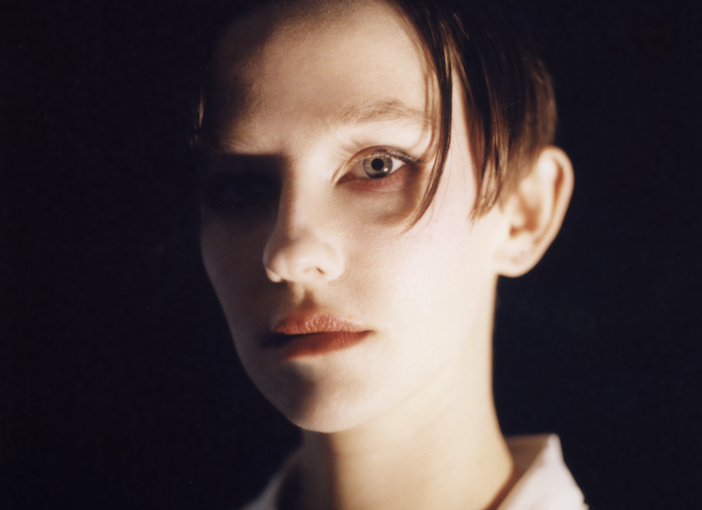I spent my last year in Los Angeles watching desert sunsets and serving a café morning rush on two hours of sleep. In hindsight, these experiences are oddly similar. A labored sublime mirrors the serene in its escape from complete understanding. It’s impossible to describe this force because individual reaction cannot totalize omnipotence. Drew McDowall’s latest album Agalma excavates this power.

Released via Los Angeles and New York label Dais Records, the approach on the LP to cutting up reality (as found audio) into lucid psychoacoustics scores resembles the work of contemporaries, such as the late Genesis P-Orridge as well as avant garde bands Psychic TV and COIL (McDowall once played in both). Their mode of creating transcendence manifests in subdued yet corrosive forms across Agalma’s compositions—sonic alterations of past and present into spiritual possibility.
Although the word “agalma” is defined as a cultural artifact, McDowall’s album covers the behaviors and tensions behind its ontology. The record’s haunting field recordings and drone ambiences—collaborative compositions between a younger generation of artists such as Kali Malone, Elvin Brandhi, and Caterina Barbieri—lament the imperceivable. Notably for Barbieri and McDowall, loss in understanding turns toward the supernatural, wherein the artists focus on objects and automation as loci for realizing psychedelia.
On a video call with Barbieri in Milan and McDowall in New York, I learn of their collaboration on Agalma, the opportune obsolescence of tradition and machinery for creating psychoactive states, and how we shouldn’t return to what was once considered normal after the pandemic is over.
**The definition of the word agalma refers to a cultural object from when I was looking it up, at least on4 that’s physically perceivable in that it’s like an artifact, but it seems like you’re approaching it a little differently on the record. Can you talk about that?
Drew McDowall: For me, the most productive—I hate that word—the most rewarding aspects of artistic work is when I can manage to take myself out of the equation. I’ve always viewed music as a kind of ritual object.
**It feels like it’s more about the behaviors and reactions around this kind of ‘objecthood’.
DM: Definitely, the recipient of the power of the object is also who gives the object its power. And so, it’s a completely circular experience—a mutual transference.
**There’s also this part of agalma which I read is about appeasing a supernatural force. Was that discussed at all during the production of the record. If so, what would the supernatural force be?
DM: I think it’s always a good idea to cover your bases. There are all sorts of entities there, and you don’t want to piss them off. Protect your neck, I think it’s always a good idea. There wasn’t any specific entity in mind. I’m always conscious of this feeling behind the veil that there are these voices that are just bubbling. I’m not sure if it’s necessarily about appeasing them; maybe just pleasing them might be a better way to approach it.
**How did the collaborators help mediate that? There are many on the record.
DM: One of the motivations for the record was to give voice to those, or give substance to those feelings. They can always be turning words. I really valued those moments that are just indescribable. It’s kind of frustrating talking because I’m talking about something that’s ineffable and not able to be put into words. For example, the track that Caterina has on it—when I listen to her music there’s an elegy quality that’s woven into everything that she does.

Caterina Barbieri: Yeah, it was quite incredible. When I got the track and first listened to it, it
resonated so much with my sonic taste and the mood as you described it; like an elegy, sort of devotional.
**You’re both referring to this elegy and seem to have a shared understanding of it. Could you explain what that means generally and also in the context of this record?
DM: The elegy is just my interpretation of a sense of loss but not without beauty as well, you know that. Elegy was maybe my closest thing to trying to put a name on something that, at its heart, is memos. Growing up in Scotland—it’s a very ‘elegy’ place.
CB: It’s interesting, Drew, that you like this word to describe the music because I think that actually ancient Greek poetry is quite pre-associated with music. It was like a song. It had this melodic aspect to it, but then it was like a funeral song. This melancholic aspect is very tied to the Nordic, as well.
DM: When I half-jokingly referred to Scotland, it’s because one of the influences for me and making music was a form of Scottish bagpipe music called Pibroch. It’s like a solo bagpipe. It’s always a lament for something, like a fallen friend who’s died or a fallen comrade. Melancholy is so deeply part of the Scottish character because of invasion and loss.
** I want to turn the conversation towards you, Caterina, and talk about your approach to synthesis and machine learning. It seems to be driven in part by the past capability of technology given that basic synthesis has already been replaced by a lot of digital hardware.
CB: Yeah, I’m very interested in the limitations of machines. I think that machines always create paths along which creativity moves, and becomes, and these spots are a sort of spatial and temporal. I approach machines as oracles. I like to think music has this sort of feedback, integrity between you and the technology. I seek to consume processes, like computational processing into creative practice, almost like forms of psychedelia. Sound almost becomes this psychoactive substance somehow.
**You mentioned psychedelia. It seems like both of you embrace psychedelia in your understanding of technological possibility.
DM: It definitely has informed everything that I do. I mean, that’s a cliche, but it allows you to enter spaces that you wouldn’t otherwise have such easy access to. What’s your take on it, Caterina?
CB: I always experience sound as a medium to access altered states of consciousness. I’ve been exploring using a lot of acceleration and deceleration processes. As you said, Matt, sometimes it’s true, using simple elements, like just patterns, working with permutation in a series of sequencing techniques that create this really weird trance-like state. The title of my album Ecstatic Computation—this is this expression because I use a lot of automatic procedures through the programming of my sequences. But then the goal, of course, is to transcend those aspects and turn on automatic procedure into something else that can be described as excellence. I think that Drew’s music is really like that. Every time I listen to his live performances, I really go out of time and space.
DM: That’s the goal, to create something that puts people in a liminal space that somehow feels adjacent to the sacred or the sublime.
**It’s interesting how you both work on different levels to create that effect. You mentioned earlier, Drew, about taking field recordings in New York and trying to capture the sort of monotony of daily life, which in itself is also a pattern.
DM: Repetition is such a part of ritual and of music that is insanely powerful for a cyclic psychoactive quality. Often I find myself being put into a translate stick with just some repetitive motion or sound or light that isn’t intentional. That’s the kind of well-documented thing we all can experience.
CB: I’m also interested in working with certain aspects of music that could sound predictable as fixed teachers. Being able to shift the perception around it—it can be very powerful.
**I want to talk about machine learning and the ‘Agalma V’ video with Kali Malone. It seemed like you were addressing this concept of information. I want to pose this question to both of you, how do you think information technology is affecting us?
DM: I have totally contradictory feelings and impulses about information technology. We’re so embedded in it; basically, we are, at this point, machinic. When the pandemic happened, that stunning feeling of just everything stopping, being embedded in part of this machine that just suddenly stops? I think that allows us to ask questions about what we are and who we are. I was thinking about this recently, I was in Death Valley in California. The first time I went to Death Valley was maybe in 2010.I was stunned by the silence. The whole of Death Valley was covered in wildflowers. Zoom forward a few years, and you can’t have that experience anymore, because everything is instagrammable. Then it just becomes algorithmically exponential.
CB: I’m just exhausted by the speed and scale of information and the access to information that the internet offers, I totally agree with you Drew. During the pandemic, I had this impression that like, almost like a positive feeling, like the word got stuck, we can have some important conversations. I really hope they will still happen because everybody seems to want to go back to normality. The pandemic was quite interesting. There were people playing on the terraces, in the courtyards, and it was a different way of sharing music. I’m curious to see what will happen but I’m not so keen on going back to normality.
DM: This idea that there is a normal we should or should want to go back to is horrific. There’s a lot of darkness in the world but also potential. People are having the conversations that they weren’t having a few years ago about structural change.**













